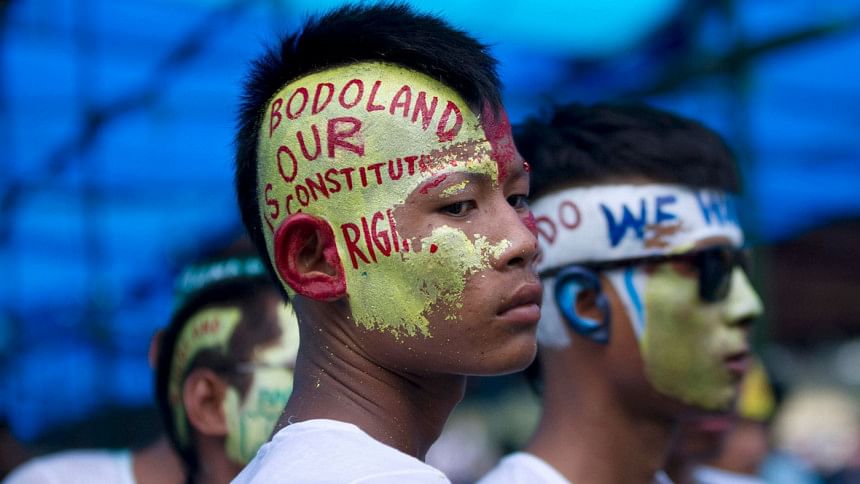Will the new Bodo accord give peace a chance in Assam?

The signing of the tripartite peace agreement among different factions of National Democratic Front of Bodoland (NDFB), the Indian government and the Assam authorities on January 28 has set the stage for an end to one of the longest-running insurgencies in the northeastern state of India. According to Home Minister Amit Shah, the nearly four-decade-old Bodo insurgency has claimed 4,000 lives.
This was the third peace accord with the Bodo outfits since the movement and insurgency for a separate Bodoland to be carved out of Assam had begun in late 1960s. The first two agreements were signed in 1993 and 2003, but unlike the January 28 one, they did not cover all the Bodo groups. That was the reason why Prime Minister Narendra Modi said the latest accord "stands out." That was why Shah termed the accord as "comprehensive" as it brought under its ambit four splinter groups of NDFB, All Bodo Students Union (ABSU) and United Bodo People's Organization. As per the accord, a total of 1,550 militants of the NDFB would lay down their arms and their armed units would be dismantled. The militants will be given a lump sum payment of ex-gratia, as per the accord.
The movement for a separate Bodo state began in 1967-68 and gained momentum in 1987 under the banner of ABSU. Subsequently, the armed militant group Bodo Security Force came into being with Ranjan Daimary as its top leader. It was later rechristened NDFB, which later suffered splits. However, the demand for a Bodo state was the common thread that ran through all factions of the Bodos.
The January 28 peace accord has been arrived at without any mention of the demand for a separate state to be carved out of Assam. Amit Shah said the territorial integrity of Assam has been assured with the accord because every single Bodo group has come on board. However, when asked about their demand for a Bodo state, ABSU President Promod Boro said, "the issue would be discussed at the right time." Assam Finance Minister Himanta Biswa Sarma insisted the demand for a Bodo state has ended with the latest accord.
The messaging of the peace accord with all the Bodo outfits without compromising the territorial integrity of Assam is considered significant for the state's ruling Bharatiya Janata Party, which is facing the heat of protests over the Citizenship Amendment Act (CAA). In fact, Assam was initially the hotbed of anti-CAA protests and five persons perished in police firing on protesters and violence. In the 2016 assembly elections, the Assamese people had given a major mandate to the BJP. With unrest still simmering among the majority Assamese-speaking people over the CAA, the BJP hopes to benefit from Bodos—who have a sizable presence in the four districts of Kokrajhar, Chirang, Baksa and Udalguri in Assam—in the fresh assembly polls due next year.
Many provisions of the latest peace agreement are reworked versions of the earlier two ones. For instance, granting more legislative, executive and financial powers to the existing Bodoland Territorial Council. Another highlight of the January 28 accord is that it provides for the establishment of a commission to reconstitute the existing Bodo Territorial Areas District (BTAD) by including new Bodo-dominated villages and excluding villages with non-tribal majority population. Also, the BTAD will be renamed Bodoland Territorial Council. The accord comes with promises of packages for promoting education through the establishment of a National Institute of Technology, sports through Sports Authority of India, and development of bamboo, handloom and dairy industries in Bodo-dominated areas and setting up of a railway coach manufacturing factory.
To showcase the third Bodo peace accord as a big achievement, the BJP has called a rally in Kokrajhar on February 7. But challenges to peace remain. The first two peace accords with Bodo outfits failed to end the militancy by them. One just has to recall that 90 people died in serial blasts set off by Bodo insurgents in Assam in October 2008, and 40 Bangla-speaking Muslims were killed in Baksa district in 2014. It remains to be seen how the third agreement works. A key question following the agreement is how the fault lines between Bodos and non-Bodos in the four districts shape up. The competition for land in the area is the main bone of contention between Bodos and non-Bodos, and has the potential to spark ethnic tensions afresh. That, in turn, could add to the cauldron of unrest caused by the anti-CAA protests in Assam and reignite militancy by the anti-talks faction of United Liberation Front of Asom (Independent) headed by its fugitive supremo Paresh Baruah.
It is not without a reason that Assam's finance minister, who was present in New Delhi at the time of the signing of the January 28 accord, talked about a more inclusive peace effort in Assam by roping in outfits which are yet to join the negotiations. Both Sarma and Assam Chief Minister Sarbananda Sonowal are keen to have ULFA (I) at the negotiations table. Paresh Baruah reportedly told a TV channel in Assam that his group was ready for talks if its demand for "sovereignty" is on the agenda.
Pallab Bhattacharya is a special correspondent for The Daily Star. He writes from New Delhi, India.

 For all latest news, follow The Daily Star's Google News channel.
For all latest news, follow The Daily Star's Google News channel. 



Comments